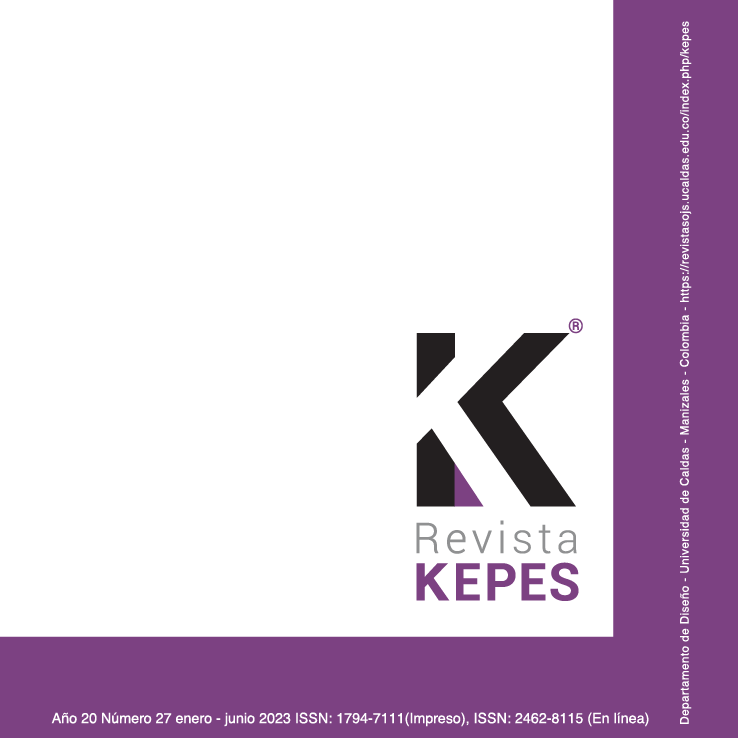Autores/as
Resumen
Este artículo argumenta que si queremos llegar al Diseño para la pluriversalidad, no podemos hacerlo desde una noción universalista de lo que significa ser Diseñador. Este artículo describe brevemente los esfuerzos para descolonizar el Diseño, para luego examinar dos aproximaciones de Diseño en métodos de Diseño comprometidos socialmente, que enmarcan cómo los Diseñadores conectan a lugares y personas: Diseño Situado y Empatía en el Diseño. Estos discursos son luego matizados con un lente decolonial, detallando cómo los Diseñadores se sitúan y se comprometen a través de la matriz colonial del poder. Este análisis sirve como un mapa de aspectos a tener en cuenta para comprender la relación del Diseñador con lugar, historia, profesión y personas en la matriz colonial del poder. El artículo sugiere la normación de awarenessing, una toma de conciencia reflexiva orientada a la acción, sobre la propia posicionalidad, la flexibilidad en los procesos de Diseño y la incorporación de aspectos personales en el Diseño como posibles formas de abrir posturas pluriversales en el Diseño. El artículo concluye delineando las implicaciones potenciales de estas posturas para hacer, escribir y enseñar Diseño.
Palabras clave
Citas
Alves da Cunha, P. F. (2015). Capoeiras e valentões na história de São Paulo (1830-1930). Alameda Casa Editorial.
Buckley, C. (1986). Made in patriarchy: Toward a feminist analysis of women and design. Design Issues,3(2), 3. https://doi.org/10.2307/1511480
D’Amico-Samuels, D. (1997) Undoing Fieldwork: Personal, Political, Theoretical and Methodological Implications. In F.V. Harrison (ed). (1997). Decolonizing Anthropology: Moving Further toward an Anthropology of Liberation. 2nd ed. American Anthropological Association.
Escobar, A. (2015). Transiciones: A Space for Research and Design for Transitions to the Pluriverse. Design Philosophy Papers,13(1),13-23. https://doi.org/10.1080/14487136.2015.1085690
Escobar, A. (2018). Designs for the Pluriverse: Radical Interdependence, Autonomy, and the Making of Worlds. Duke University Press.
Fanon, F. (1961). The Wretched of the Earth. Penguin Books.
Freire, P. (1996). Pedagogia da autonomia: Saberes necessários a prática educativa. Paz e Terra.
Freire, P. (1970). Pedagogy of the oppressed (New rev. ed). Penguin Books.
Grosfoguel, R. (2007). The Epistemic Decolonial Turn: Beyond political-economy paradigms. Cultural Studies, 21(2-3), 211-223. https://doi.org/10.1080/09502380601162514
Grosfoguel, R. (2002). Colonial Difference, Geopolitics of Knowledge, and Global Coloniality in the Modern/Colonial Capitalist World-System. Review (Fernand Braudel Center), 203-24.
Haraway, D. (2016). Staying with the Trouble: Making Kin in the Chthulucene. Duke University Press.
Haraway, D. (1988). Situated Knowledges: The Science Question in Feminism and the Privilege of Partial Perspective. Feminist Studies, 14(3), 575-599. https://doi.org/10.2307/3178066
Kaufmann-Buhler, J., Pass, V. R. and Wilson, C. S. (eds). (2019). Design History Beyond the Canon. Bloomsbury Publishing.
Koskinen, I., Battarbee, K., & Mattelmeaki, T. (2003). Empathic design. IT press.
Mainsah, H., & Morrison, A. (2014). Participatory design through a cultural lens: Insights from postcolonial theory. Proceedings of the 13th Participatory Design Conference: Short Papers, Industry Cases, Workshop Descriptions, Doctoral Consortium Papers, and Keynote Abstracts, 0(2), 83-86. https://doi.org/10.1145/2662155.2662195
Mareis, C., & Paim, N. (eds). (2020). Design Struggles. Valiz.
Mignolo, W. (2007). Introduction: Coloniality of Power and de-Colonial Thinking. Cultural Studies, 21(2-3),155-167. https://doi.org/10.1080/09502380601162498
Mignolo, W. (2012). Local Histories/Global Designs: Coloniality, Subaltern Knowledges, and Border Thinking. Princeton University Press.
Mignolo, W. (2018). Pensamiento Decolonial. In G. D´Alisa, et al. (eds.)
Decrecimiento: vocabulario para una nueva era - Edición ampliada para Latinoamérica (pp. 343-347). Icaria.
Moran, U. C., Harrington, U. G., & Sheehan, N., (2018). On Country Learning. Design and Culture,10 (1),71–79. https://doi.org/10.1080/17547075.2018.1430996
Redström, J. (2017). Making Design Theory. Design Thinking, Design Theory. The MIT Press.
Rêgo, W. (1968). Capoeira Angola: Ensaio Socioetnográfico. Fundação Gregório de Mattos.
Simonsen, J., Svabo, C., Strandvad, S. M., Samson K., Hertzum, M. and Hansen, O. E., (2014). Situated Methods in Design. MIT Press.
Suchman, L. (1993). Working relations of technology production and use. Computer Supported Cooperative Work, 2(1-2), 21-39.
Tlostanova,. (2017). On Decolonizing Design. Design Philosophy Papers,15(1) 51-61. https://doi.org/10.1080/14487136.2017.1301017
Torretta, N. B., & Reitsma, L. (2019). Design, power and colonisation: Decolonial and anti-oppressive explorations on three approaches for Design for Sustainability. Conference Proceedings of the Academy for Design Innovation Management, 2(1). https://doi.org/10.33114/adim.2019.04.314
Trias Cornú, L. (2020). (De)Institution Design: Decolonizing Design Discourse in Uruguay. Pivot 2020 Conference. Tulane University.
Tunstall, E. (Dory). (2013). Decolonizing Design Innovation: Design Anthropology, Critical Anthropology, and Indigenous Knowledge. In W. Gunn, et al. Design Anthropology : Theory and Practice (pp. 232-250) Bloomsbury Academic. https://doi.org/10.5040/9781474214698
Van Amstel, F. M. C., & Gonzatto, R. F. (2020). The anthropophagic studio: Towards a critical pedagogy for interaction design. Digital Creativity, 31(4), 259-283. https://doi.org/10.1080/14626268.2020.1802295
Vazquez, R. (2017). Precedence, Earth and the Anthropocene: Decolonizing design. Design Philosophy Papers, 15 (1), 77-91. https://doi.org/10.1080/14487136.2017.1303130
Wenger, E. (1999). Communities of practice: Learning, meaning, and identity. Cambridge University Press.

 PDF (English)
PDF (English)
 FLIP
FLIP























